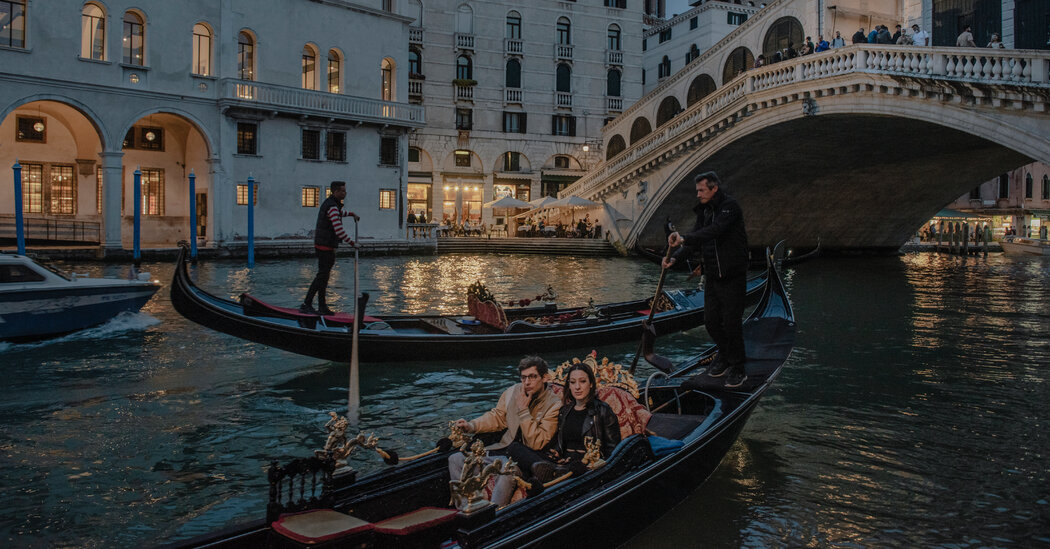Starting next spring, day-trippers to Venice — at times when the city is extremely crowded with tourists — will be expected to pay 5 euros for the privilege.
A measure to impose the fee was passed Tuesday by the Venice City Council as part of its strategy to better manage — and perhaps even limit — the hordes of tourists who flock each year to the fragile lagoon city.
“We have to show the world that for the first time, something is being done for Venice,” Mayor Luigi Brugnaro said after the vote. “There’s always someone who will say it’s not enough, but then nothing is done concretely,” he added, according to the news agency ANSA.
Rising improbably from the waters of the Venetian lagoon, this canal-crossed city is as beautiful as it is delicate, and in recent decades it has struggled to protect its uniqueness.
Threatened by climate change and rising seas, it installed a modern engineering behemoth, giant gates at four mouths of the lagoon to keep seawater out and its pavements dry, and it banned cruise ships from its inner canals.
But so far Venice officials have failed when it comes to tourist control, especially of the day-trippers carrying picnic lunches who make a beeline for the most famed attractions — the Rialto Bridge and St. Mark’s Square — clogging the city’s tiny streets while contributing very little to its economy.
About five million people have visited Venice so far this year, according to local officials, 10 percent fewer than in 2019.
This week, the United Nations culture agency, UNESCO, is expected to decide whether Venice should be placed on its World Heritage in Danger list. A document released in July said the city had not made enough progress in preventing damage from mass tourism, climate change and development projects.
City Hall had announced plans to introduce a fee last year, but it was postponed to help local businesses that depend on tourism recover from the pandemic, whose effects were felt until this year, said Michele Zuin, the city’s councilor in charge of the budget.
The €5 fee is “a contribution,” not an entrance ticket, Mr. Zuin said in a telephone interview in which he explained that the program was still in an “experimental phase.” He said the fee would be applied on the 30 days next year that typically draw the largest crowds to Venice. The dates have not been announced.
All visitors to Venice would need to go online, though a dedicated platform that is not yet operative, to receive a QR code to print out or save to their phone. Anyone staying for just the day would then pay the fee.
Visitors staying overnight would receive a different QR code noting their status and would not have to pay the fee, and neither would people who come into the city for work. Other exemptions include residents of Venice and the Veneto Region, children under 14, people studying in Venice, people who own property there and their immediate families and those who fall within a few other categories.
As part of the plan, municipal police and authorized inspectors would check people at random and anyone without the proper QR code would face a fine of between 50 euros and 300 euros, about $53 to $321. Residents will not need a QR code, just proof of residency. During the discussion on Tuesday, Mr. Brugnaro said the QR code was not a geo-tagging device, and that “no one will be tracked,” the news agency ANSA reported.
City officials said they hoped tourists would reserve their visits ahead of time.
“We’re used to reserving hotels, restaurants, train tickets when we visit a city, it’s normal,” Mr. Zuin said. “In this way, tourists can have a better experience of the city, while residents can live better as well,” he added. The fee won’t be charged off-season, which typically falls during the winter months, with the exception of Carnival.
City Hall has no intention of limiting the number of visitors to the city, Mr. Zuin said, adding: “Venice will never impose a closed number. It’s a special city, we can’t shut it.”
But starting in 2025, a fee could be charged on more days and the amount of the fee could rise. “The more people who come, the more it will cost after a certain threshold,” Mr. Zuin said. That threshold is one thing that the experimental phase will determine, he said, adding, “We’re very flexible.”
Not everyone is in favor of the new fee.
Monica Sambo, a City Council member from the center-left Democratic Party, called it a confirmation that Venice has become “a theme park, a Disneyland,” where “you get in by paying an entrance fee.”
The money raised by the fee will not be allocated specifically to public services that are significantly affected by tourists, like the often-crammed city’s vaporetti, or water buses. “It’s going to be swallowed up in some general coffer,” Ms. Samba said.
And the fee does little to confront the question of overcrowding, because it does not limit the number of tourists overall. Italy has laws that can be applied when public order is at risk, Ms. Sambo said. “On some days, when the city is especially full, public order is at risk, and it becomes a question of public security,” she added.
Two years ago, as part of its tourism-management strategy, City Hall set up a control room, to monitor people coming to the city through the visitors’ cellphones. The data it collected, Ms. Sambo said, has not been shared with opposition City Council members even though it had been requested repeatedly, to better understand tourist habits.
About 200 citizens staged a protest on Tuesday afternoon during the City Council deliberations, which lasted five hours, the news agency ANSA reported. They affixed a banner in the entrance hall that read: “The ticket won’t save us, we want houses, work and low rents.”



